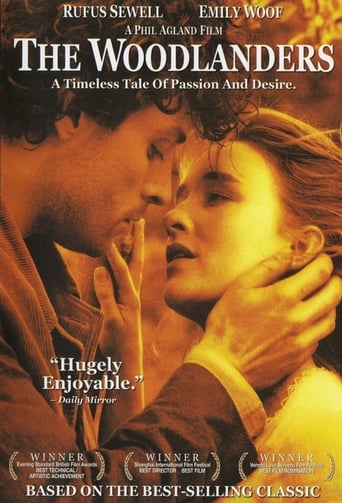ianmabb
Saw this at our wonderful new local cinema just a mile or so from where most of the film was shot. We were even lucky enough to have a Q and A with the cinematographer who worked on the film after. He lives locally, by the name of Ashley Rowe. I absolutely loved the film, and what a terrific chap! He rounded off a fab night with extremely interesting information about the shooting of the film and his role in it. Thank you so much to him for attending, despite having to leave for the shooting of a new film it London tomorrow at some ridiculously ungodly hour! A special thank you to the Regal volunteer Barry Robbins, who helps run our fab new cinema. You are doing an amazing job Barry! A terrific evening for me, which as a keen Thomas Hardy fan it is hard to top. If Mr Rowe should happen to read this - do watch Schalcken the Painter. It was actually 1979 (not 1982) , but the link re the point re treatment of light, I think, is a valid one. Plus - please try and make Under the Greenwood Tree!
kijii
I have really discovered Thomas Hardy through wonderful movies like Tess (Tess of the d'Urbervilles) (1979), Far from the Madding Crowd (1967 & 2015) and the 1978 TV mini-series of The Mayor of Casterbridge as well as the 1971 TV mini-series , Jude the Obscure (1971). This is also a wonderful discovery for those of us who have come to love movie versions of Thomas Hardy novels (or stories). It tells the story of a young woman who has been sent off to finishing school by her father so that she can rise above the level she has grown up in: the lower- class timber workers of the deep woods in 19th-century rural England.Though she and a local woodlander had had an agreement to marry when they came of age, her father wants something better for her and encourages her to marry a local doctor who lives and practices in the village. She agrees to marry the doctor, but soon learns that he cannot stand the crude rustic manners of the local people. This sets up a series of conflicts between her and her father as well as the way she feels about the life she had been raised in and the life that her father wants for her. I love the way the story unfolds as well as the dark (and often wet) sylvan atmosphere that it so capably captures and inhabits.
trimmerb1234
I found this very involving and affecting in a way that I've not found other Hardy adaptations or the books themselves. As a film it has an unusual combination of modesty of style - no great acting showiness - and of the characters themselves, allied to an inspired and faultless control of light and mood.It has an immense integrity - the recreations of the woodlander's homes and workplaces, as mentioned earlier the superb faultless control of the quality of light (longish scenes shot just after dawn, at dusk etc etc), the authentic period behaviour and manners, the unforced pace mirroring the mood. It is full of traditional understated virtues both the story itself and in the way it wears its technical virtuosity.If Titanic (mentioned by an earlier reviewer) was a great clanking iron CGI mechanical monster, heavy handed in all departments, this is all living and breathing humanity on a human scale - an increasingly rare treat.
vnpns
I haven't the slightest idea what a spoiler is and I doubt whether many folks who are not film buffs will know either, so I'll just have to hope that my comments don't enter that category and request that you use a non-jargon word in order that us ordinary punters can understand.I cannot agree with comments made concerning the scenes dragging or the film itself lacking cinematic scope. Some critics have taken this view but I believe this is rather an indication of how susceptible critics can be to saying what they think people will expect them to say (whilst conveying the distinct impression that they are the most bravely objective critics in the world).No, this is a film which refuses to go at the pace expected of it but, rather, courageously moves at the precise pace demanded of it by the overall direction and approach. I am glad I haven't read the book because it might have tempted me to try to make a like-for-like comparison and thereby go on to make erroneous deductions.The two mediums, film and literature, demand different approaches and, to me anyway, this thoughtfully filmed tale is at ease with itself and that is all we can ask of it. It is not trying to be Gone With The Wind or even Pride and Pejudice, nor should it make the attempt.Like Bleak House, it will completely glide past the attention span of the viewer who is anxious for untimely progression or who is not mentally prepared for its purposely ponderous and understated theme. What I would suggest, most humbly, is that anyone with doubts set aside a whole evening with nothing else planned and no interruptions possible. Then forget anything you have previously experienced concerning this tale and view it afresh. Put away any cynical prejudgement and consciously assume that the film's understated acting is fully intended as such. Then I believe your experience and enjoyment of this film will improve no end.The director was no doubt under immense pressure to make this tale more paced and juicy. I, for one, fully commend him for resisting this and producing a magnificently restrained U film, a truly English shared countryside, domestic and subtly romantic experience - at least for anyone allowing it the space to embrace them. VNP.


